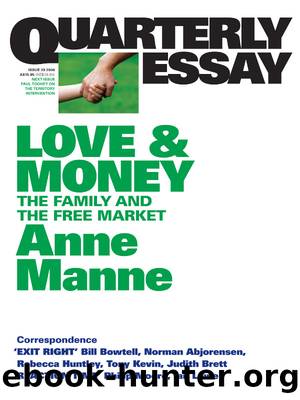Quarterly Essay 29 Love and Money by Anne Manne

Author:Anne Manne [Manne, Anne]
Language: eng
Format: epub
Tags: Social Science, Sociology, Marriage & Family, Feminism & Feminist Theory, Family & Relationships, Parenting, Motherhood, Business & Economics, Women in Business, Women's Studies, Family Relationships
ISBN: 9781921825286
Google: AV7iAAAAQBAJ
Publisher: Black Inc.
Published: 2008-03-01T05:33:38+00:00
EXIT
RIGHT
Correspondence
Bill Bowtell
âWe can win the election, but he cannot,â was Peter Costelloâs blunt assessment of the Coalitionâs prospects were John Howard to lead it into the 2007 election.
A year ago, not many observers of Australian politics agreed with Costello. Most professional commentators were sure that John Howard would coast to an easy victory on the back of a buoyant economy. They dismissed Costello as a self-interested Cassandra (perhaps forgetting that Cassandra was proven correct). One of the few who shared Costelloâs view was the long-time historian and scholar of the Liberal Party, Judith Brett.
She believed that the times no longer suited John Howard and was convinced that he would not prevail against Kevin Rudd.
Backing her conviction, Brett staked her claim on the first post-election Quarterly Essay to explain the reasons for John Howardâs defeat. In it, she argued persuasively that John Howard was simply too old, too dogmatic and too out of touch with the shifting centre of Australian public opinion to counteract Kevin Ruddâs drive, dynamism and fresh-faced appeal.
Yet her compelling Quarterly Essay also points the way to an explanation for the Howard governmentâs decline and fall that is more complex and more significant than the argument that ageing leaders are generally unable to come to terms with their own obsolescence.
The most significant question posed by the 2007 debacle is precisely why did the Liberal Party throw it all away. Why, when all the economic winds were set fair, and the political shoals to be negotiated were not especially hazardous, did the crew of the Liberal ship of state allow its captain to steer indefatigably to the extreme right? Even when the cliffs loomed above them, and disaster was imminent, why did they not toss Howard overboard and set a new course?
Was Peter Costello right in asserting that the election was winnable for the government but only without John Howard? Or was it the case, as Judith Brett believes, that the Liberal Party no longer had the means or the will to act independently of its leader?
Costello was understandably keen to succeed to the prime ministership rather than become leader of the opposition. Throughout 2007, he stridently made the case for John Howardâs early departure to his party colleagues and the press gallery and, through them, to the public. He asserted that a simple change of leader was all that was required for the Coalition government to prevail at the 2007 election. Costello might have been acting from self-interest, but he also had the weight of evidence on his side. From the day of Kevin Ruddâs elevation to the Labor leadership, the direction of the polls was undeniably wretched news for the Coalition government. Rudd and the Labor Party maintained handsome leads over Howard and the government. As the months wore on and the polls did not shift, there could be no reasonable doubt that the Howard administration would be resoundingly defeated at the elections.
But Costelloâs case for change failed. Prepared to wound, but unwilling to strike, Costello destabilised
Download
This site does not store any files on its server. We only index and link to content provided by other sites. Please contact the content providers to delete copyright contents if any and email us, we'll remove relevant links or contents immediately.
The Compound Effect by Darren Hardy(8968)
Tools of Titans by Timothy Ferriss(8396)
Nudge - Improving Decisions about Health, Wealth, and Happiness by Thaler Sunstein(7707)
Win Bigly by Scott Adams(7199)
Deep Work by Cal Newport(7085)
Rich Dad Poor Dad by Robert T. Kiyosaki(6633)
Principles: Life and Work by Ray Dalio(6449)
Pioneering Portfolio Management by David F. Swensen(6301)
Digital Minimalism by Cal Newport;(5765)
The Barefoot Investor by Scott Pape(5745)
Grit by Angela Duckworth(5615)
The Slight Edge by Jeff Olson(5418)
Discipline Equals Freedom by Jocko Willink(5390)
The Motivation Myth by Jeff Haden(5212)
You Are a Badass at Making Money by Jen Sincero(4930)
The Four Tendencies by Gretchen Rubin(4603)
Eat That Frog! by Brian Tracy(4540)
The Confidence Code by Katty Kay(4260)
Bullshit Jobs by David Graeber(4190)
